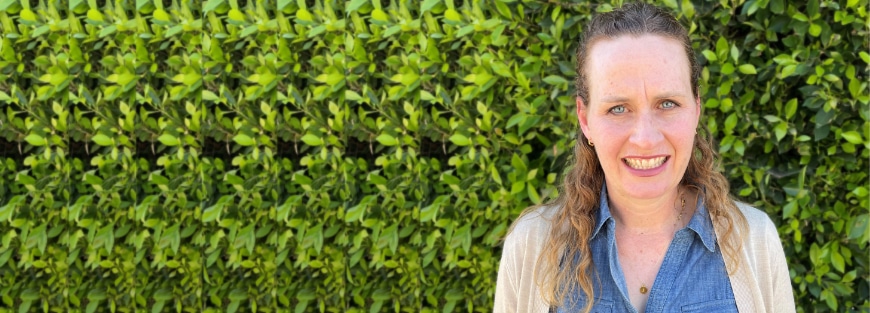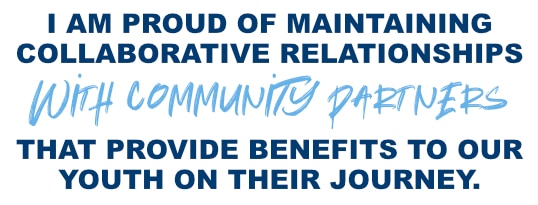Alumni Profile: Jennifer Hicks
Posted by: DVULI | April 12, 2022

by Kimberlee Mitchell, Staff Writer
► ALUMNI: Jennifer Hicks (Los Angeles 2010)
► ORGANIZATION: Neighborhood Homework House
► CURRENT POSITION: Executive Director
How long have you been involved in youth ministry and how did you know you were called to reach this generation of youth?
Since graduating from school, I have been involved in ministering to youth for more than 20 years. I didn’t have a burning bush moment in my life, and I cannot point with certainty to a specific affirmation. However, I have always been one to pray about being a good steward of my gifts.
Tell us about your youth program and how you fulfill its mission.
 Neighborhood Homework House (NHH) was founded in 1997 as a grassroots organization. We offer a junior high program that provides homework assistance and places students in mentoring groups to discuss character formation. Our senior high program offers a study hall space for students and a curriculum to prepare students for life after high school. The program also offers coaching for students and resource field trips.
Neighborhood Homework House (NHH) was founded in 1997 as a grassroots organization. We offer a junior high program that provides homework assistance and places students in mentoring groups to discuss character formation. Our senior high program offers a study hall space for students and a curriculum to prepare students for life after high school. The program also offers coaching for students and resource field trips.
We intentionally partner with parents through seminars, computer-based adult literacy in English and Spanish, committee leadership opportunities, familial support groups, and community-building events. We provide holistic ministry for the entire family. In addition, we have a Mommy and Me early childhood program and an elementary homework program. As executive director, many of my responsibilities involve donor development, partner and stakeholder relationships, and administration. I still have some interaction with youth but in less hands-on ways.
Why do you think God has called you to this work?
I had opportunities after graduating from college to work with either a suburban church or a non-profit to address LA’s Skid Row neighborhood. I remember feeling as though a suburban church would not have a problem filling the vacant position. The little non-profit couldn’t even afford to pay me back then, but I felt they could use my talents and ministry skills more. Also, there was a deeper connection with the organization because it was located in the San Gabriel Valley, where I grew up.
While I have a passion for youth, I also have a passion for parents. I believe we need to do more than just send a letter home or have one meeting a year. Partnering with parents and equipping them for their role is very important. Sometimes youth ministries can put themselves at odds with parents. We must remember that parents have the greatest impact on the life of the child, not the youth ministry.
What do you hope to accomplish while you serve in this capacity?
I hope to walk alongside children in their early years and see them graduate from high school and go on to college, especially if it means they’ll be the first in their families to do so. I hope to see them grow to become independent adults who are equipped to empower others. I also hope their parents are a part of the journey and able to lead their child to that goal.
 What challenges have you or the organization had to overcome?
What challenges have you or the organization had to overcome?
Like other organizations, we have been hit by the pandemic. Staff turnover has been a challenge, perhaps because NHH tends to attract people right out of college. Some believe they will participate just for a couple of years until they launch their careers or find a better-paying job. Turnover impacts our students and families because youth ministry and community development are relational. If a staff member packs up and moves to Texas, it takes a while for youth or parents to build that much-needed connection with someone new.
What are you most proud of that the program has accomplished?
I am proud of maintaining collaborative relationships with community partners. These key relationships provide benefits to our youth on their journey. For example, we have a young lady who has been in our program since the second grade. There’s a picture of her in our conference room from that time, and as I was interviewing her, I asked where the picture was taken. The photo was taken at the ministry where I worked before I came to NHH. Recently, I received a random $5,000 check from a church partner who I have been developing for years. Because of COVID, they had some unused funds and decided to give them to NHH. There are some deep wells with our community partners and we are reaping the overflow of those nurtured relationships.
Who does your organization partner with that is benefiting this work?
We have about five churches that generously provide financial support. They also offer us volunteers, prayer support, and various training for youth and parents. They even invite our youth to attend their church youth group gatherings. The Azusa Unified School District (AUSD) is another community collaboration that shares several opportunities including student referrals to our program from the teachers, community leadership team participation, parent engagement, and participation in training. [DL(CF3] We also partner with Azusa Pacific University, Immigration Resource Center, Pasadena Tournament of Roses, Southern California Gas Company, and more. These partnerships afford us service projects, bilingual support, and youth camp opportunities. Our partners are our allies and NHH is the same for them.
How can your DVULI family be praying as you move forward?
Many in our community are experiencing housing insecurity, which is so hard for us. It’s a complicated problem. Pray that we can keep kids safe. Also, when an organization is short-handed, the people working there are prone to burnout. We are living in a challenging job economy and if the pay doesn’t meet needs people look in other directions. We need prayer for staff sustainability.
This article was published in the Spring 2022 issue of DVULI’s On the Level print newsletter.

